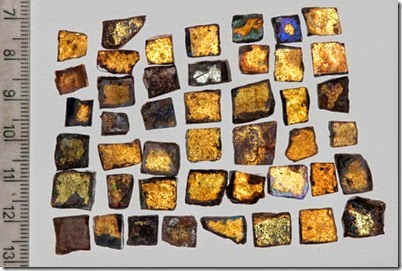The Temple Mount Sifting Project is profiled at length by Ilan Ben Zion in The Times of Israel. If you’ve been following the work for the last decade, much of the report will sound familiar. But Ben Zion provides some detractors with the opportunity to showcase their ignorance.
Israel Finkelstein: “the debris could also have been brought from other locations” besides the Temple Mount.
Marwan Abu-Khalaf: whatever was in that soil may have come from the surrounding Kidron Valley.
Yonathan Mizrachi: the sifting project “doesn’t have any archaeological value.”
First, they tried to prevent archaeologists from studying the material illegally removed from the
Temple Mount. When that failed, they try to deny it has any significance. Unfortunately, news reports like this one allow them to say whatever they want, without any evidence whatsoever.
Ben Zion describes some of the discoveries made since the project began in 2004.
Most of the tens of thousands of items found in the pans by volunteers are small — an abundance of coins, innumerable fragments of clay, figurines, brightly colored mosaic tiles and beads, arrowheads, inscribed stones and bits of bone. In explaining the trove of tiny artifacts found, Barkay made regular reference to biblical and post-biblical characters in corresponding the items to time periods: clay figurines smashed during the time of the just kings of Judah, seal impressions with the names of priests mentioned in the book of Jeremiah and coins minted during the rein of King Antiochus IV Epiphanes, who fought the Maccabees. The relics catalog the history of Jerusalem from antiquity through the modern era.
The full story, with many photos, is published here.
HT: Joseph Lauer
UPDATE (6/12): The director of the sifting project has responded.
Photo courtesy of The Temple Mount Sifting Project

One thought on “The Temple Mount Sifting Project and Its Detractors”
I believe it showcases dishonesty, not ignorance. Ignorance would be, "Oh, there's a sifting project? Please tell me where so I can visit." Or, "Did they find artifacts among the dirt? I was not aware of this. Please tell me more."
No, this is deliberate dishonesty. For Finkelstein, I don't recall ever hearing him say of his Megiddo excavations, "We found some artifacts here, but they could have been brought from other locations." Or, "Our recent excavations have uncovered many artifacts, but since none of them bear inscriptions, our work is of no significance."
Dishonesty driven by a subjective bias. If Tel Aviv University had a Code of Honor to uphold, they would terminate him for tarnishing their academic reputation, but apparently they don't.